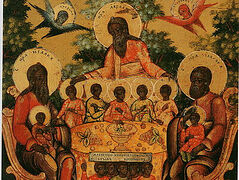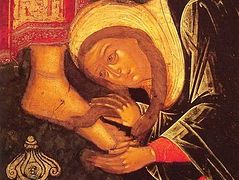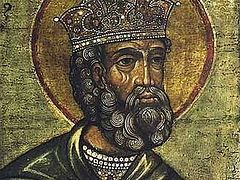 Hieromonk Philofei (Makharramov)
Hieromonk Philofei (Makharramov)
In the name of the Father, and of the Son, and of the Holy Spirit.
Dear brothers and sisters in the Lord! Now we are walking through Holy Week—all these days are associated with the walking of our Lord Jesus Christ to His suffering and His Passion. In these days, many of us gather here in the church, and these services are very difficult and complicated; they last about five hours, and we make bows during them… And they are experienced differently by every person. It is unlikely that while standing here for these five hours we all feel good, comfortable, and sense the presence of grace. Most of us probably feel burdened as we stand here; it is hard for us both physically and spiritually to carry this heavy load. But what is all this for?
The holy elder, Schema-Archimandrite Vitaly (Sidorenko; 1928–1992), said that each day of Holy Week sanctifies each day of the year. That is, Holy Monday sanctifies all Mondays, Holy Tuesday—all Tuesdays, Holy Wednesday—all Wednesdays, and so on. Therefore, with our presence in the church we sanctify our entire year, invoking God’s help and His grace. Because in these most sorrowful days in the Lord’s life we try to be here with Him and even suffer a little bit for Him.
On the whole, the main theme of Holy Week is suffering, and this theme is probably the most difficult one. This is the theme at whih people ask God and themselves the most questions. And during this week the Book of Job is read: it tells us about the most righteous man of his day, especially in pagan times. It tells us that Job offered sacrifices to God every day while thinking: “What if even in their thoughts my children have sinned against God?” So he feared that they might have sinned even in their thoughts... This man was of perfect righteousness. And a sign (especially in the Old Testament times) of God’s blessing was material well-being: the more children you have, the more blessed you are; the same principle applied to wealth.
And then this man in one moment (not over a long period, gradually, but in an instant) lost everything he had. He lost his property, his fortune, even his family and children—he lost everything at once. While one of his servants was reporting that all his houses had burned down, another came to inform him that all his herds and flocks had been stolen, a third one reported that all his servants had been murdered, and a fourth one came and said that all his children had died suddenly. Job rent his mantle and exclaimed: The Lord gave, and the Lord hath taken away; blessed be the name of the Lord (Job 1:21). We have been singing this phrase, these blessed words during services for many centuries.
But that was not all. Then Job lost the only thing he had had—he lost his health and was covered with oozing sores. And according to the laws of that age, such people were driven out of cities. Among other things, the severity of suffering lies in loneliness. A person is very lonely at these moments. Even when Christ (and we will remember that) prayed in the Garden of Gethsemane, He asked His disciples to stay with Him, but they were all asleep. And when He was crucified on the Cross, the Lord was experiencing the peak of Passion, since He exclaimed: My God, my God, why hast Thou forsaken Me? (Mt. 27:46). That is, in moments of suffering, a person is left alone, and no one can help him, share his grief and understand him—neither his mother, nor his father, nor children, nor friends. Even the Lord forsakes him for a while.
These are dreadful moments, truly very terrible, but what are they for? Many questions arise at these moments, but it’s probably difficult to answer them right away—these answers come after the results have appeared. And this suffering is a bitter pill for the disease that we remembered before the beginning of Lent—Adam’s expulsion from Paradise—how Adam was deceived by the devil who said: “Break the commandment and you will be like God.” And this horrible disease is cured by suffering. At the moment of this suffering a person experiences the full depth of his misery and nothingness, that he is a nobody. And this state—if a person accepts it in some way and experiences it with faith in God—makes him worthy of the Heavenly Kingdom and everlasting bliss in God.
So, this theme is the most important and the most difficult one. When Job was at the peak of his suffering, he started asking God terrible questions, each of which began with the words: “What for? Why? What have I done?” God gave him a very interesting answer. He appeared to Job, who had invited God to trial, and showed him (you can reread it—it will be very useful) His omnipotence and omniscience and asked him a counter-question: “Who are you to advise Me?” (cf. Job 38:2). And Job, who a short time before had considered himself full of the right and dignity to ask God questions so audaciously (and probably anyone looking from the outside would have agreed with him that, indeed, Job was worthy to ask such questions), said: Lord, I abhor myself, and repent in dust and ashes (Job 42:6).
Everything was returned to Job: children and houses. And Job became a type of Christ, which is why this book is read during Holy Week. That is why, dear brothers and sisters in the Lord, we are standing at the service right now, and in general this whole week is very difficult, especially for those who are trying to be in church, with God, and act according to their conscience. And don’t worry if we do not see the results of the labors we are performing this week right away; they will certainly come later, and the Lord will bless us and help us in tough times throughout the year. May God help and save all of you.





